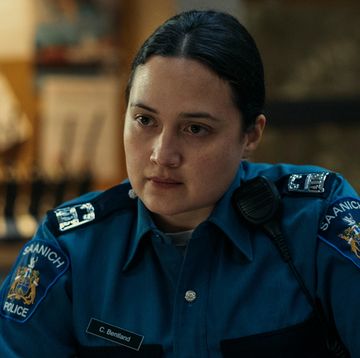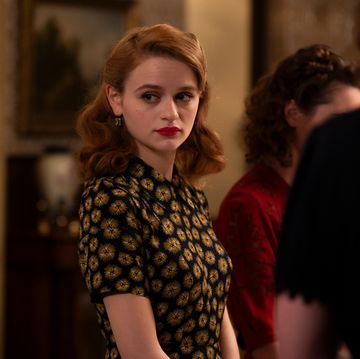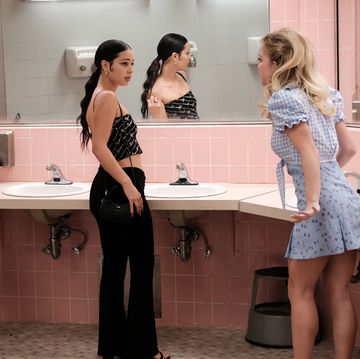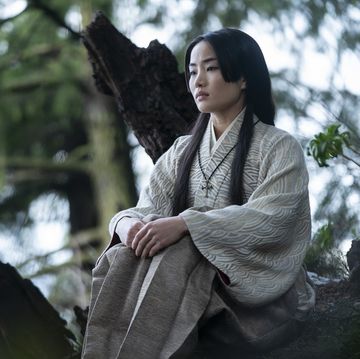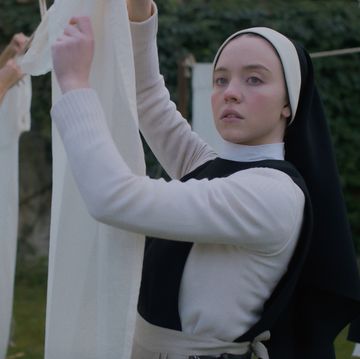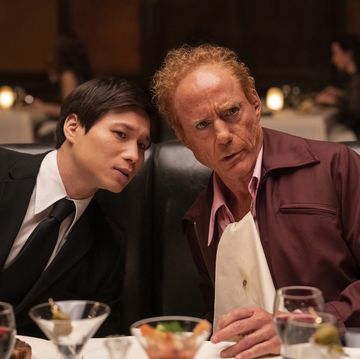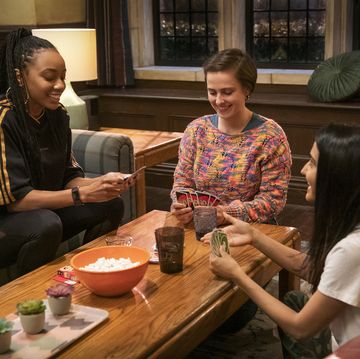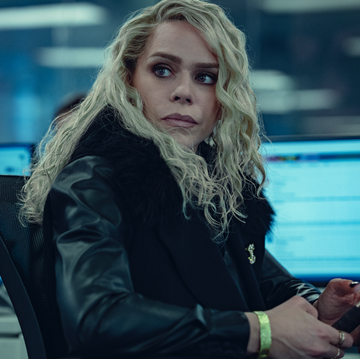FX's new series American Crime Story: The People v. O.J. Simpson offers seemingly everything a viewer might need to experience the drama of the O.J. Simpson trial—everything, that is, except one thing. It's a story that begins with a double homicide, but the only characters this show doesn't tell us much about are the murder victims themselves: Nicole Brown Simpson, the ex-wife of the man who would soon occupy the center of the "trial of the century," and her acquaintance Ronald Goldman, who had stopped by Nicole's house to return a pair of glasses her mother had left at the restaurant where he worked.
The People v. O.J. Simpson does not gloss over the horror of Nicole Brown Simpson and Ron Goldman's deaths. They were both stabbed to death in front of Nicole's Brentwood home, and twenty years later it is still impossible to imagine what their last moments must have been like. It is to the credit of FX's new crime drama that it does not attempt to do this for us, but it is to viewers' detriment that it does not attempt to tell us much else about the lives that were cut so tragically short on that night. In the real-life trial that followed, and the media crush surrounding it, Ron Goldman would all but disappear. Nicole Brown Simpson, when she was mentioned at all, would all too often emerge only as a character shaped by the needs of her husband's defense team—the slut, the gold digger, the cokehead, the bitch—while the domestic violence she suffered for years at her husband's hands all but disappeared from public view. By the time the trial was over, it was difficult even for those rare spectators who wanted to know who the real Nicole was to find out what she had been like, or to separate fact from slander.
Nicole Brown Simpson's youngest sister, Tanya Brown, is an author and life coach who speaks widely on the issue of domestic violence, and on her sister's legacy. Recently, I spoke with Tanya about the Nicole America has forgotten, but the one we still have the chance to learn more about.
What was it like to revisit the murder and the subsequent trial on its twentieth anniversary?
Every year is hard. It takes you back to that moment. But there was something really powerful about this twenty-year anniversary. People have come to us over the past twenty years saying "My god, I know exactly where I was," and… I had no idea what a huge spectacle this was. I had no idea that flowers were given to the jurors. I guess you can thank the Simpson trial for reality television as we know it today, unfortunately… [and] that was what affected me, the spectacle of this whole thing: how glorified it was. How big it was. I didn't know the magnitude of it.
Keep in mind, this was my family. We were out in the public, but every day we were here at our house. We were living, trying to create some kind of normalcy for our life. At that point, we were like "Where are we going to put Sydney and Justin [Nicole and O.J.'s children] into school? How can we create some sort of normalcy for them? What do we need to do with Nicole's house? What do we need to do with her clothes?" We were just trying to create what everybody else does when somebody passes away, but in the meantime you've got this circus going on outside.
Is there anything you think the public missed at the time, or is missing now, that you wish was part of this public conversation?
Yeah! They don't know who Nicole is. They don't know who she was. Everybody knows Nicole as the celebrity wife and the woman who lived every day as a battered woman and who lived every day as a miserable person—and yes, her life was tumultuous. We all learned this. But Nicole was a mother, she was a daughter, she was a sister, she was a friend… People don't know that she opened up her home for the holidays when nobody had a place to go to. She brought people into her home when they had birthdays… She would bake cookies with her kids.
She was an amazing mom. She always put her kids first. Always put her kids first. Some people may come back to me and say, "Well, no, she didn't, because she allowed the abuse to go on." You know what? Unless you understand the dynamics of domestic violence, she was putting her kids first. She was trying to create an environment of love and hope and healing, trying to make things work, but we don't know what we don't know. Twenty years ago we didn't have this conversation. We didn't know what domestic violence was.
Nicole was a phenomenal cook. She was a messy cook. She was like the Tasmanian devil in the kitchen. She had flour all over her face, messy kitchen counters. She made amazing meals… And it would be casual yet full of life, full of laughter, full of family, full of friendship. And it was abundant. It was abundant. She made sure that…everybody was happy. And that was Nicole. Nobody knows that.
Nicole was very hands-on. Yeah, she had nannies, but she wasn't one of these moms who had a nanny who said "go pick up the kids so I can go to a spa." That was so not Nicole. That was the furthest from Nicole. The nanny would be there to be that third hand, that third and fourth arm, if [she needed] laundry or whatever, but Nicole was very hands-on with her children.
In 1992, she told me that she was asking for a divorce. We were at Spago for New Year's Eve, and she had the perfect opportunity to share with me that she wasn't happy. She had the perfect opportunity to say, "This is what he's been doing to me." but instead, she said, "I'm asking for a divorce tonight."
No explanation. No explanation about anything. No indication of any violence. Nothing. She just wasn't happy. And I had no idea what was going on, and she said to me, "I've been trying to keep this marriage together for five years, and I'm the only one dancing, and I can't do it anymore."
And the first thing out of my mouth was this: "Nic, do you love your kids?"
And she [said], "More than I love my own life."
Do you think that she had reached a point where she was finally feeling free to move forward?
Yeah! In fact, she even said to [our older sister] Denise, I think the night of the [murder], "I can't wait to start my new life. Let's go camping. Let's go to Club Med. Let's take the kids on vacation." …So she was ready to really live a normal life: "Let's hang out with our kids, let's play, let's go camp, let's ski." And she was really ready to find some friends, because I think she just really realized that she didn't have any friends.
Do you see her marriage as holding her back?
You know what? I think she would have loved more than anything to begin this new life with him—if there was a will or a participation on his end to make it work. I'm coming from a point of view where I didn't know what was going on in her marriage—but I know she was nuts about the guy. I mean, even on the night that she got killed, she said to my mom, "He will always be my soul mate."
Do you think the average American woman knows more about domestic violence today than they did twenty years ago?
Oh, absolutely. Over the past twenty years, when Denise and I have traveled across the country, we get emails and we come in contact with people, and strangers say "If it wasn't for your sister I'd be dead," or "If it wasn't for Nicole I'd still be in a violent relationship."
So Nicole is that face of domestic violence. She is that face. But my God, so much more education and awareness needs to be done. I don't know if people are ignorant or unwilling to be educated, but it seems people still live in the world of, "Why doesn't she pick up and leave?" And it's not that easy. A person—a woman—has a 75% higher chance of getting killed if she does leave. So why should she leave?
Do you think retrospective attention to the trial can be positive? What do you think the public needs to know about the case to take something meaningful from it, rather than just going back to a story they already know?
I think people really need to view it from where I'm at now, where just because he's a celebrity doesn't mean that he's incapable of doing such a crime. Regardless of whether somebody believes [O.J.] killed her, he still beat her up. I want people to walk away saying, "Wow, this is the dynamic of a domestic violence relationship." It's very seductive. It's alluring. It's manipulative. It's sexy at times. It's very subliminal. It's very serpent-like. It just kind of sneaks into your life, and then eventually ends up consuming you—and by that time it's too late.
Do you think O.J. was the main character in the marriage as well as in the trial?
No, I think Nicole was, because she was the one who kept the family together. She was the rock. She went out of her way—but out of joy and out of desire and out of want. She wanted to be that mom and be that wife and be that homemaker, not because she had to, but because she wanted to. That's just who she was. And that's how I want people to remember her.




